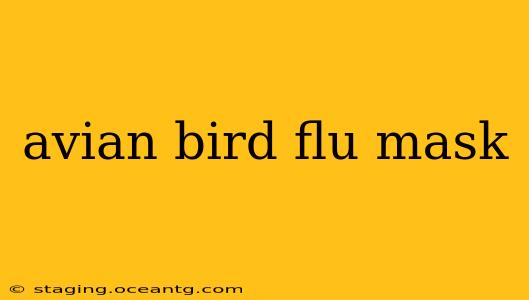Avian influenza, commonly known as bird flu, is a highly contagious viral infection affecting birds worldwide. While human infections are rare, understanding the risks and taking preventive measures is crucial. This article explores avian bird flu, its transmission, and the protective measures individuals can take.
What is Avian Bird Flu?
Avian influenza viruses are categorized into highly pathogenic (HPAIV) and low pathogenic (LPAIV) strains. HPAIVs cause severe disease and high mortality rates in birds, while LPAIVs typically cause milder illness. Different subtypes of avian influenza exist, with some, like H5N1 and H7N9, having caused sporadic human infections. These infections usually result from close contact with infected birds or contaminated environments. The virus primarily infects the respiratory and digestive systems of birds, leading to various symptoms depending on the strain and the bird species.
Does Avian Bird Flu Require a Specific Mask?
There isn't a specific "avian bird flu mask." The effectiveness of a mask in protecting against avian influenza depends on the type of mask and the level of exposure. The best protection against airborne viruses, including avian influenza, comes from using respirators, specifically N95 or higher-rated respirators. These respirators filter out a higher percentage of airborne particles, including virus particles. Surgical masks offer some protection, but their effectiveness against smaller particles like those in airborne viruses is less than respirators.
What Kind of Mask Protects Against Bird Flu?
As mentioned above, N95 respirators or higher offer the best protection. These masks are designed to filter out at least 95% of airborne particles. They create a tight seal around the nose and mouth, minimizing the risk of virus inhalation. However, the correct fit is crucial for effective protection. If you're unsure about the fit or how to use an N95 respirator, seek guidance from a healthcare professional.
What Precautions Should I Take to Avoid Avian Bird Flu?
Beyond mask usage, several other precautions are vital in minimizing the risk of avian influenza infection:
-
Avoid contact with sick or dead birds: This is the most crucial step. Do not touch wild birds, especially those appearing sick or dead. Report any findings of dead birds to your local animal control or health authorities.
-
Practice good hygiene: Frequent handwashing with soap and water is essential. Use hand sanitizer if soap and water are unavailable.
-
Avoid touching your face: Avoid touching your eyes, nose, and mouth, especially after handling potentially contaminated surfaces.
-
Cook poultry thoroughly: Ensure that poultry is cooked to an internal temperature that eliminates any potential virus.
-
Maintain good respiratory hygiene: Cover your mouth and nose with a tissue or your elbow when coughing or sneezing.
-
Stay informed: Keep up-to-date with the latest information on avian influenza outbreaks from reliable sources like the World Health Organization (WHO) and your local public health authorities.
Are Surgical Masks Effective Against Avian Flu?
Surgical masks offer some level of protection but are less effective than N95 respirators against smaller airborne particles, like those carrying viruses. While they can provide a barrier against larger droplets, they are not the primary recommended protective measure against avian influenza. Prioritizing an N95 respirator or higher is strongly recommended if exposure risk is high.
Can I Catch Avian Flu From Eating Cooked Chicken?
The risk of contracting avian influenza from properly cooked chicken is extremely low. Thorough cooking, to an internal temperature high enough to kill the virus, renders the meat safe for consumption. However, maintaining proper hygiene while handling raw poultry is still crucial to prevent cross-contamination.
This information is for general knowledge and does not constitute medical advice. Always consult a healthcare professional for any concerns about avian influenza or other health issues. Remember that staying informed and practicing good hygiene are your best defenses against avian flu.
